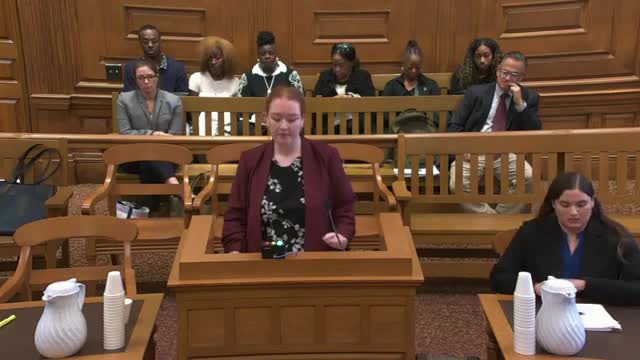Court hears gripping arguments in high-stakes robbery case
November 01, 2024 | Judicial - Appeals Court Oral Arguments, Judicial, Massachusetts
This article was created by AI summarizing key points discussed. AI makes mistakes, so for full details and context, please refer to the video of the full meeting. Please report any errors so we can fix them. Report an error »

In a recent courtroom session, the prosecution presented a compelling argument regarding the sufficiency of evidence in the case surrounding the tragic shooting of Raymond Holloway Creighton. Assistant District Attorney Julie Higgins, alongside her colleagues, emphasized the circumstances leading to the incident, which occurred in the early hours of the morning.
Higgins outlined three key factors that contributed to the likelihood of resistance from Creighton during the attempted robbery of his scooter, valued at approximately $800. Firstly, the intrinsic value of the scooter was highlighted, as it represented a significant financial investment for Creighton, who had purchased it for $912. Secondly, the scooter was essential for Creighton's livelihood as a Grubhub delivery driver, making it even more critical for him to retain possession. Lastly, the timing of the incident—around 3:30 AM in a potentially dangerous neighborhood—was presented as a context that would naturally lead to a heightened expectation of resistance.
The prosecution argued that the defendant's awareness of these factors should lead the jury to infer that he anticipated pushback from Creighton. Higgins referenced previous case law, including Commonwealth versus Cologne, to support the assertion that co-venturers in a robbery can be held accountable for the actions of their accomplices, particularly when they are aware of the potential for resistance.
The discussion also touched on the nature of the defendants' planning, as evidenced by Facebook messages exchanged prior to the incident. These messages indicated a premeditated intent to steal a scooter, which further substantiated the prosecution's claims regarding the defendants' knowledge of the situation.
As the court deliberated on the evidence presented, the prosecution maintained that the facts of the case warranted a thorough examination by the jury, emphasizing the importance of considering the life experiences of individuals involved in such incidents. The session underscored the complexities of proving intent and knowledge in criminal cases, particularly in scenarios involving armed robbery.
Higgins outlined three key factors that contributed to the likelihood of resistance from Creighton during the attempted robbery of his scooter, valued at approximately $800. Firstly, the intrinsic value of the scooter was highlighted, as it represented a significant financial investment for Creighton, who had purchased it for $912. Secondly, the scooter was essential for Creighton's livelihood as a Grubhub delivery driver, making it even more critical for him to retain possession. Lastly, the timing of the incident—around 3:30 AM in a potentially dangerous neighborhood—was presented as a context that would naturally lead to a heightened expectation of resistance.
The prosecution argued that the defendant's awareness of these factors should lead the jury to infer that he anticipated pushback from Creighton. Higgins referenced previous case law, including Commonwealth versus Cologne, to support the assertion that co-venturers in a robbery can be held accountable for the actions of their accomplices, particularly when they are aware of the potential for resistance.
The discussion also touched on the nature of the defendants' planning, as evidenced by Facebook messages exchanged prior to the incident. These messages indicated a premeditated intent to steal a scooter, which further substantiated the prosecution's claims regarding the defendants' knowledge of the situation.
As the court deliberated on the evidence presented, the prosecution maintained that the facts of the case warranted a thorough examination by the jury, emphasizing the importance of considering the life experiences of individuals involved in such incidents. The session underscored the complexities of proving intent and knowledge in criminal cases, particularly in scenarios involving armed robbery.
View the Full Meeting & All Its Details
This article offers just a summary. Unlock complete video, transcripts, and insights as a Founder Member.
✓
Watch full, unedited meeting videos
✓
Search every word spoken in unlimited transcripts
✓
AI summaries & real-time alerts (all government levels)
✓
Permanent access to expanding government content
30-day money-back guarantee

